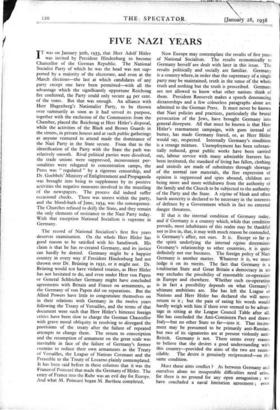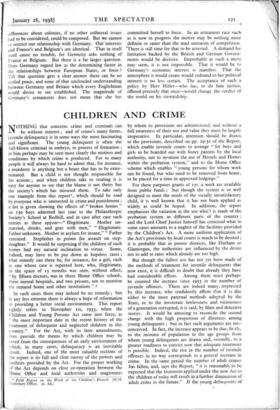FIVE NAZI YEARS
TT was on January 3oth, 1933, that Herr Adolf Hitler was invited by President Hindenburg to become Chancellor of the German Republic. The National. Socialist Party of which he was the head was not sup- ported by a majority of the electorate, and even at the March elections—the last at which candidates of any party except one have been permitted—with all the advantage which the significantly opportune Reichstag fire conferred, the Party could only secure 44 per cent. of the votes. But that was enough. An alliance with Herr Hugenberg's Nationalist Party, to be thrown over summarily as soon as it had served its purpose, together with the exclusion of the Communists from the Chamber, placed the Reichstag at Herr Hitler's disposal, while the activities of the Black and Brown Guards in the streets, in private houses and at such public gatherings as anyone ventured to attend made the dominance of the Nazi Party in the State secure. From that to the identification of the Party with the State the path was relatively smooth. Rival political parties were dissolved, the trade unions were suppressed, inconvenient per- sonalities were relegated to concentration camps, the Press was " regulated " by a rigorous censorship, and Dr. Goebbels' Ministry of Enlightenment and Propaganda was brought into being to supplement by its positive activities the negative measures involved in the muzzling of the newspapers. The process did indeed suffer occasional checks. There was unrest within the party, and the blood-bath of June, 1934, was the consequence. The Churches refused to deify the State, and they remain the only elements of resistance to the Nazi Party today. With that exception National Socialism is supreme in Germany.
The record of National Socialism's first five years deserves examination. On the whole Herr Hitler has good reason to, be satisfied with his handiwork. His claim is that he has re-created Germany, and its justice can hardly be denied. Germany might be a happier country in every way if President Hindenburg had not thrown over Dr. Bruning in 1932, or it might not. Dr. Bruning would not have violated treaties, as Herr Hitler has not hesitated to do, and even under Herr von Papen or General Schleicher Germany might have concluded agreements with Britain and France on armaments, as the Germany of von Papen did on reparations. But the Allied Powers have little to congratulate themselves on in their relations with Germany. in the twelve years following the Treaty of Versailles, and the terms of that document were such that Herr Hitler's bitterest foreign critics have been slow to charge the German Chancellor with grave moral obliquity in resolving to disregard the provisions of the treaty after the failure of repeated attempts to change them. The return to conscription and the resumption of armament on the great scale was inevitable in face of the failure of Germany's former enemies to reduce their own armaments as the Treaty of Versailles, the League of Nations Covenant and the Preamble to the Treaty of. Locamo plainly contemplated. It has been said before in these columns that it was the -France of Poincare that made the Germany of Hitler. The entry of France into the Ruhr was an evil day for Europe. And what M. Poincare began M. Barthou completed. Now Europe may contemplate the results of fiVe years of National Socialism. The results economically to Germany herself are dealt with later in this issue. The results politically and socially are familiar Germany is a country where, in order that the supremacy of a single party may be maintained, truth in the sense of the whole truth and nothing but the truth is proscribed. Germans are not allowed to know what other nations think of them. President Roosevelt makes a speech denouncing dictatorships and a few colourless paragraphs alone are admitted to the German Press. It must never be known that Nazi policies and practices, particularly the brutal persecution of the Jews, have brought Germany into general disrepute. All that must be known is that Herr Hitler's rearmament campaign, with guns instead of butter, has made Germany feared, or, as Herr Hitler would say, respected." Internally Germany's condition is a strange mixture. Unemployment has been substan- tially reduced, great public works have been carried out, labour service with many admirable features has been instituted, the standard of living has fallen, clothing and utensils are made of substitutes through shortage of the normal raw materials, the' free expreSsion of opinion is suppressed and spies abound, children are being more and more withdrawn from the authority of the family and the Church to be subjected to the authority of the Party and the State. A regime of bleak and often harsh austerity is declared to be necessary in the interests of defence by a Government which in fact no external danger threatens.
If that is the internal condition of Germany today, and if Germany is a country which, while that condition prevails, most inhabitants of this realm may hi thankful not to live in, that, it may with much reason be contended, is Germany's affair, not ours. It is Except so far as the spirit underlying the internal regime determines Germany's relationship to other countries, it is quite definitely not our business. The foreign policy of Nazi Germany is another matter. Whatever it is, we must judge it on its merits. The fact that Germany is a totalitarian State and Great Britain a democracy in no way excludes the possibility of reasonable co-operation in Europe and elsewhere. Whether such co-operation is in fact a possibility depends on what Germany's ultimate ambitions are. She has left the League of Nations and Herr Hitler has declared she will never return to it ; but the pain of eating his words would hardly weigh with him if there ever seemed to be advan- tage in sitting at the League Council Table after all.
She has concluded the Anti-Comintern Pact and drawn Italy—but no other State so far—into it. That instru- ment may be presumed to be primarily anti-Russian, but two of its signatories are at present violently anti- British. Germany is not. There seems every reason to believe that she desires a good understanding with this country—provided the aims of the two are recon- cilable. The desire is genuinely reciprocated—on the same condition.
Must those aims conflict ? As between Germany and ourselves alone no insuperable difficulties need arise, for there is no ground for any open antagonism ; NNe- have concluded a naval limitation agreement ; even differences about colonies, if no other collateral issues had to be considered, could be composed. But we cannot so restrict our relationship with Germany. Our-interests and France's and Belgium's are identical. That in itself need cause no trouble, for Germany asks nothing of France or Belgium. But there is a far larger question. Does Germany regard law as the determining factor in the relationships between European States, or force ? Till that question gets a clear answer there can be no settled peace, and none of that unclouded understanding between Germany and Britain which every Englishman would -desire to see established. The magnitude of Germany's armaments does not mean that she has committed herself to force. In an armament race such as is now in progress the motive may be nothing more definite or saner than the mad unreason of competition. 'There is still time for that to be arrested. A demand for limitation backed by the British and German Govern- ments would be decisive. Improbable as such a move may seem, it is not impossible. That it would be to Germany's economic interest is manifest. That the atmosphere it would create would redound to her political interest is no less certain. The acceptance of such a policy by Herr Hitler—who has, to do him justice, offered precisely that once—would change the verdict of the world on his stewardship.



















































 Previous page
Previous page